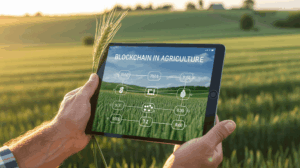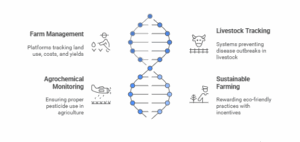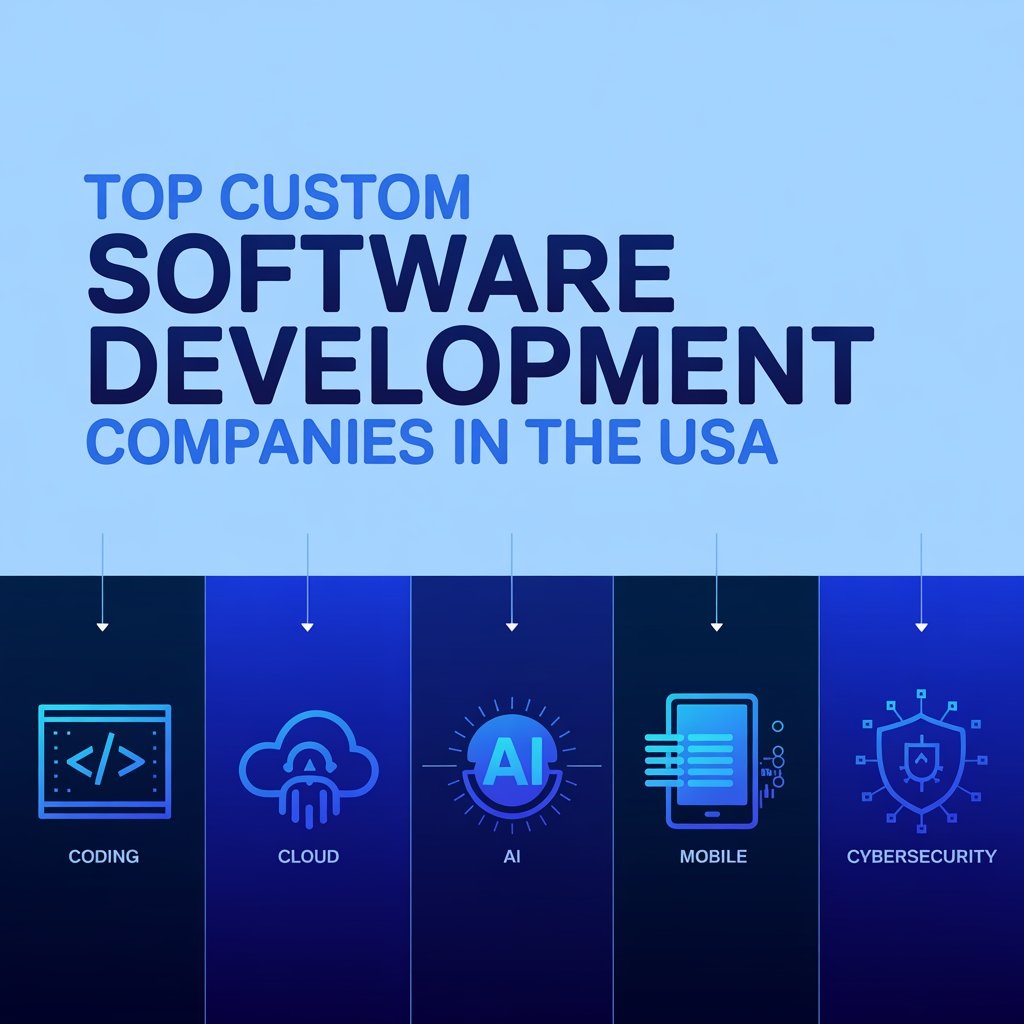Blockchain technology has already started to revolutionise a wide range of industries, and one of the most revolutionary applications is blockchain in agriculture. In 2025, blockchain is helping farmers increase productivity, achieve traceability, and foster greater confidence between suppliers and customers as food supply chains become more complex and sustainability becomes a global necessity.
This article examines how blockchain farming can increase transparency throughout the ecosystem, lower fraud, streamline logistics, and empower smallholder farmers. The time to comprehend the potential of blockchain technology in agriculture has come, regardless of whether you are a government agency or an agritech startup.
What Is Blockchain in Agriculture?
What exactly is blockchain in agriculture, to put it simply? This distributed ledger technology allows for decentralisation, accountability, and traceability by storing agricultural data in real-time. It is particularly useful in rural areas with inadequate infrastructure because, in contrast to traditional systems, it lessens reliance on centralised authorities.
Why Blockchain Is a Game-Changer for Agriculture
Blockchain is decentralised, unchangeable, and impervious to tampering, in contrast to conventional databases. Data cannot be changed once entered, which makes it perfect for monitoring pesticide use, livestock conditions, and crop production. Because of this fundamental idea, using blockchain in agriculture is a workable way to validate transactions, uphold food safety regulations, and guarantee product authenticity.
Advantages of Blockchain in Agriculture

The benefits of blockchain technology in agriculture are extensive and touch nearly every stakeholder, from farmers and distributors to regulators and consumers:
- Transparency: From the field to the shelf, agricultural products can be tracked by all parties involved, including farmers, distributors, retailers, and consumers. A level of visibility that was previously impossible in traditional systems is made possible by blockchain’s immutable ledger, which guarantees that every entry—from the procurement of seeds to the final delivery—is verifiable and impenetrable.
- Traceability: The blockchain keeps a permanent record of important product data, including harvest dates, pesticide usage, soil conditions, and cold chain information like transit temperatures. By supplying evidence of origin and handling, end-to-end traceability not only promotes quality control and adherence to food safety regulations but it also fosters consumer trust.
- Cost savings: Blockchain streamlines the flow of information and goods by doing away with middlemen and lowering the need for manual paperwork. Significant operational savings can be achieved by farmers and agricultural cooperatives by reducing administrative burden, preventing expensive documentation errors, and speeding up payment cycles.
- Efficiency: Smart contracts make it possible for agreements to be executed automatically, such as when insurance payouts are triggered by weather data or payments are made upon delivery confirmation. Without requiring third-party enforcement, this automation guarantees that all terms are fulfilled, minimizes human error, and expedites transaction processing.
Read more on how to implement blockchain efficiently.
Disadvantages of Blockchain in Agriculture
While the benefits are compelling, it’s worth acknowledging the disadvantages of blockchain in agriculture:
- Technical complexity: The adoption of blockchain technology in agriculture poses a significant learning curve for numerous smallholder farmers. In addition to digital literacy, these systems frequently call for dependable internet connectivity and compatible device access, which are scarce resources in many rural areas. Farmers might have trouble understanding how to enter data, decipher blockchain records, or use the system to make decisions if they are not properly onboarded. This emphasises the necessity of continuous training initiatives and user-friendly interfaces.
- Initial costs: Blockchain solution deployment necessitates initial expenditures for system integration, software, hardware, and training. These expenses may be unaffordable for small businesses or cooperatives unless they are backed by government grants or private partnerships. Even though there may be long-term savings and efficiencies, adoption is still significantly hampered by the initial cost, particularly in developing nations where margins are narrow and credit is limited.
- Energy consumption: Due to consensus techniques like Proof of Work, traditional blockchain platforms like Bitcoin and Ethereum (before updates) have come under fire for using a lot of energy. This may be a disadvantage in agricultural settings where sustainability is of utmost importance. Modern blockchain models that use Proof of Stake or other low-energy protocols, on the other hand, are much more effective and eco-friendly, which makes them more suitable for widespread adoption in farming communities. However, when scaling solutions globally, blockchain’s energy requirements continue to be a concern.
Blockchain in Agriculture Supply Chain
Blockchain’s application in agricultural supply chain optimisation is among its most significant use cases. Because supply chains are usually dispersed, it can be challenging to maintain reliable quality assurance and delivery schedules. Blockchain allows growers, processors, distributors, and retailers to exchange data in real time by digitising and decentralising the entire chain.
Smart contracts improve cost savings and decrease disputes by ensuring that payments are released automatically when shipment milestones are reached.
Blockchain Applications in Agriculture
The use of blockchain technology in agriculture is expanding quickly, changing both the production and distribution of food. Blockchain is generating new efficiencies in the industry, from improving supply chain transparency to automating transactions and facilitating safe data sharing. Here are some notable instances of how this technology is changing contemporary agriculture in 2025 and beyond:
- Farm management platforms that track land use, input costs, and yields
- Livestock tracking systems that prevent disease outbreaks
- Agrochemical monitoring to ensure proper pesticide use
- Sustainable farming initiatives that reward eco-friendly practices with token-based incentives
Want to explore our blockchain development services? Or hire developers who know how to bring blockchain into the fields? We’re here to help.
How Can Blockchain Be Used in Agriculture?
The question, “How can blockchain be used in agriculture?” has multiple answers. Instead of providing a universally applicable solution, the technology provides a flexible framework. Blockchain can be tailored as a toolkit of smart contracts, traceability features, and data validation protocols, depending on the particular issues that farmers or agribusinesses face, such as fraud prevention, inefficient supply chains, or export regulation compliance. It’s not a one-size-fits-all solution but a toolkit that can be customized based on needs:
- Crop authentication to reduce counterfeiting
- Carbon credit tracking for climate-resilient farming
- Decentralized marketplaces where farmers sell directly to consumers

By automating payouts when weather conditions surpass predetermined thresholds, blockchain also helps agro-insurance.
Read about the Top 8 Uses of IoT in Agriculture for Smarter Farming in our article.
Blockchain Technology in Agriculture Market
With forecasts showing a compound annual growth rate (CAGR) of more than 40% through 2030, the blockchain technology in agriculture market is expected to experience remarkable expansion. Increased consumer demand for food sourcing transparency, improved food safety protocols, and the wider digital revolution occurring in the agriculture industry are the main drivers of this upsurge.
Blockchain adoption is being prioritised by both governments and businesses to fight food fraud, enhance adherence to global standards, and lessen supply chain inefficiencies. Because of their established tech ecosystems and regulatory frameworks, North America and Europe are currently leading the way. But in Latin America and Southeast Asia, where smallholder farmers and agribusinesses are increasingly looking for scalable digital solutions to meet sustainability goals and global export requirements, adoption is picking up speed.
The market’s potential, as well as blockchain’s developing position as a key technology for more intelligent, resilient agriculture, are both reflected in this growth trajectory.
To understand blockchain’s broader impact, explore what blockchain is and how it works.
Real-World Impact: Case Studies
Through verified ethical sourcing, a Ugandan cocoa cooperative used blockchain technology to authenticate its supply chain and gain access to high-end international markets. The cooperative was able to demonstrate the provenance, care, and sustainability of its goods through the use of tamper-proof digital records, which increased buyer confidence, reduced fraud, and enabled it to command higher prices in competitive export markets.
Decentralised platforms are being used in India to verify pesticide-free farming methods in different parts of the country. In order to create an open and verifiable history, farmers directly record harvest data, input usage, and cultivation activities on the chain. In addition to increasing consumer confidence, this creates new avenues for organic certifications and access to specialised markets. These instances show the purpose of blockchain in agriculture to improve traceability, compliance, and economic inclusion while revolutionising real-world operations.
Learn how we helped build similar tools in our Livestock Management App case study.
Final Thoughts
As the world demands more sustainable, traceable, and ethical food systems, blockchain technology is playing an ever-more-important role in agriculture. Blockchain is a fundamental component of contemporary agriculture, offering benefits ranging from increased farm-level productivity to worldwide supply chain optimisation.
Working with a seasoned tech team that is knowledgeable about both the technology and the particular difficulties faced by the agricultural industry is crucial if you’re thinking about implementing blockchain in your agri-tech project.
Fortunately, we have a great deal of experience developing blockchain solutions. LITSLINK can also assist you with that. Let’s begin by getting in touch with us!





